#And others that are upset because of Tilda Swinton's casting
Text
“Doctor Strange and Iron Man I are the same story”
I have seen this comparison over and over again and it still surprises me. Both stories share the basic trope of hubris-fall-redemption structure, but so does Thor, and I hardly ever see anyone comparing them with this last one.
From the get go, the backgrounds of T*ny and Stephen are different. T*ny is a billionaire son of a billionaire. He inherited his father’s company and wealth, which are consistently managed by people not himself (Obediah, Pepper, Happy). We don’t know if Strange comes from a very rich family or not, but the fact that he has no resources to fall back on when he spends his money on surgeries suggests that he made his own money through his work. Yes, yes, a privileged work, if you want, but he had to work hard for it, studying, practicing and constantly honing his skill.
T*ny was a war profiteer. Strange was a surgeon. One helped kill people, the other helped save lives and get people better lives, even if he did so more for the sake of fame and money than for saving lives (Though he is conscious of the oath he took as a doctor and strives to honor it: he complains to the Ancient One that he killed a man in the Sanctum and that he hadn’t signed up for that, that he had taken the hippocratic oath). Also, the narrative frames this selfishness of his in a negative light, in contrast with Christine’s hidden and selfless dedication to others.)
T*ny is attacked and kidnapped, Stephen suffers an accident. T*ny escapes and gets an arc reactor on his chest to keep the shrapnel from reaching his heart, which leads to poisoning and his almost death in IM II; Stephen doesn’t lose his hands, but has nerve damaged from the injuries, so his hands shake and hurt and get cramped, permanently, putting an end to his career as a surgeon. T*ny can get an operation to remove the shrapnel so that he doesn’t need the arc reactor anymore, as proven by IM III; no operation can give Stephen the painless functionality of his hands back, as proven by the fact that he keeps trying again and again and again.
After the accident, T*ny’s loses are the war profit (but he still has a company that is worth millions) but he still is, as he likes to define himself, billionaire, playboy, etc. He lost almost nothing. In the accident, Stephen lost his profession, the work of his life, in a way his own identity and his physical integrity and health. He then lost all his money, coming to the point, when he arrives at Kamar Taj, that he carries with himself his only possessions and no money to get back. His rage and arrogance drive Christine away (As much as I like Pepper, she sticks too much to T*ny. Whenever Stephen acts like an idiot, Christine leaves him in no uncertain terms), so he is alone, with no family or friends. The last thing he has is his knowledge and too high self esteem, and that gets crushed too. He humiliated himself pleading for a broken watch with some thieves and then spent hours begging loudly at the door of Kamar Taj for the Ancient One to let him in and teach him. He had to learn from and study with people younger than him and that had less worldly prestige than he had, and see them be better at the mystic arts than him.
While T*ny is still the boss in his life and does whatever the hell he wants whenever the hell he wants and is served by others, Stephen is put in the position of being the last one, of being taught by others and of adjusting to a very different way of life from the one he was used to (The Ancient One, Mordo, Wong, they are all his masters; Christine isn’t his subordinate, she is his colleague.)
While T*ny is always his own team, refuses to obey others (e.g. when Rhodey intervenes his party, when he reveals his identity as Iron Man to the press) and lashes out when people call him out, Stephen learns to be a team player (he asks Nick, a doctor he disliked, to operate on the Ancient One, accepting that it was better that way), to listen and heed the advice of others, and his replies most of the time consist in rational justifications (’They should put the warnings before the spells’, ‘you told me to open my eye and now you ask me to obey rules that make no sense’).
Stephen becomes more perceptive and understanding of other people’s feelings, problems and points of view. He genuinely tries to learn from The Ancient One and Mordo and applies himself to study with constancy and effort; he tries to reason with Kaecillius and understand why is he doing what he is doing; he apologizes to Christine without excuses and, even if he wants her to stay with him, he doesn’t force a kiss on her, he lets her decide.
Being Iron Man is for T*ny a source of prestige, fame, and glory. He is both. Stephen is faced with the choice of healing his hands and turning back to his old life of living for himself, or moving on into becoming a hidden protector of the world, to live for others rather than himself. He chooses the latter and the narrative even frames it as a recognition of Christine being right all along: there were other things that could give meaning to his life, and other ways to save lives, even if those ways were harder and weirder. Compare the last scene of IM and Doctor Strange: T*ny reveals to the world in a press conference that he is Iron Man. Stephen looks at his still shaking hands, puts on Christine’s memento –we also see the yellow ties in his sleeves to honor the Ancient One– and then gaze at the world from the darkness and silence of the Sanctum.
Both T*ny and Stephen sacrifice their lives at the end of their origin story movies, but T*ny’s sacrifice comes to solve a problem his own irresponsibility created, while Stephen is cleaning the mess someone else made and in which he had no part. T*ny risked dying once, Stephen went to his repeated death; even if he hoped that Dormammu would accept the bargain, plan B was dying again and again and again forever, because as long as he kept dying, the world would be safe and yet nobody would know it was him.
Stephen’s heroism comes by embracing pain, brokenness, loss, and transforming them into compassion, humbleness and sacrifice. T*ny’s heroism comes by doing something with his intelligence and his money to save the world.
As someone pointed out in another post, T*ny’s arc is a coming of age story: realizing there are stakes in life and taking responsibility for our actions and gifts; Stephen’s arc is a story of maturity, of finding meaning in life, of facing pain, and loss, and the fragility of the human condition.
This is the main reason why Ir*nstrange irks me. As of Infinity War, T*ny still is a man-child, who puts his own grudges and pride over the welfare and safety of others, and that mocks others to feel superior to them. Strange is like a dead man brought back to life: he lives to protect the world, but all the petty concerns that are so important to T*ny, are irrelevant and... well, petty to him. I don’t see flirting in Strange’s annoyance and blunt replies: I see an adult trying to be patient with a spoiled child, remembering that he was like that once upon a time. If you ask me, that doesn’t look like a good foundation for a relationship.
#Doctor Strange#Stephen Strange#Anti Ironstrange#Anti Tony Stark#I finally wrote the post#In this house we love and protect Stephen Strange#I know there's a bunch of people that hates BC#And others that are upset because of Tilda Swinton's casting#But it isn't fair to judge characters and stories because we dislike actors or casting decisions#That's what criticism is for#To analize everything#keep the good and reject the bad
177 notes
·
View notes
Note
In that chart of "whitewashed" characters the most funny one is The Ancient One from Dr Strange. On one side it had a backlash from fans who didn't like that they changed him. On the other the change was made because disney didn't want to upset china by having a Tibetean character on the movie.
That's the one Tilda Swinton played right?
My knowledge of those different universes is incredibly tiny so I don't really know what the deal with any of those things are, the one I pointed out started because I knew the name but wanted to spell it right then decided to look and see from whence he came in his wiki.
Most everything I know about most of the fandoms out there I picked up from tumblr, including how batshit they can be.
if what you're saying is true about not ticking off china is true, makes sense that they'd do that, that's as good a financial decision as can be made and I don't blame them one bit for making it
might be a couple hundred people in the US that would refuse to see it over that as opposed to the entire chinese market that would never be able to see it if they did it according to lore.
Solid business decision and no matter how I feel one way or the other about characters, the marvel franchise, Disney, China, or any of that stuff I'm not going to flip my lid over something as irrelevant as that.
No real major social political statement to be made by putting them in as originally written, these are superhero movies, they're fun and fanciful.
Start rewriting the details of Schindler's List to avoid offending people, then there's gonna be words.
It's all fantasy for the movies people are getting bent out of shape over, which to a point I understand, but when it starts getting into college level essays about how changing things around will disrupt the space time continuum and tear a hole in the fabric of reality I just glaze over and go take a look at some pictures from a better day.
Like these
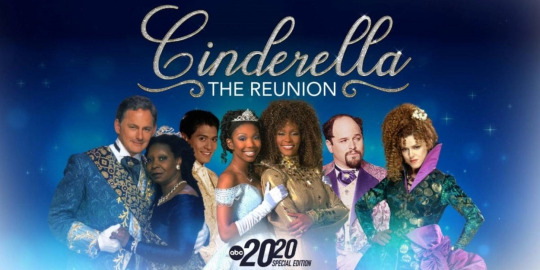
Who wants to go see Cinderella with a Black Cinderella, Queen, and Fairy Godmother (I bet brandy nearly wet herself gettin to sing with Whitney) White King who with his Black Queen managed to father a Asian Prince.
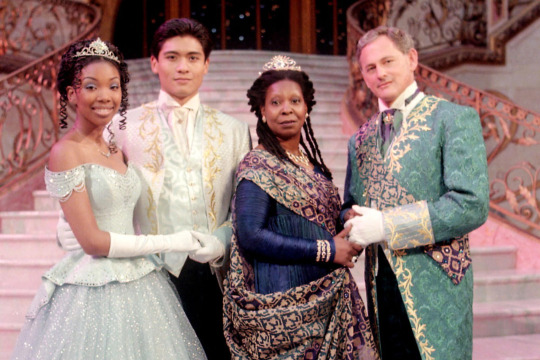
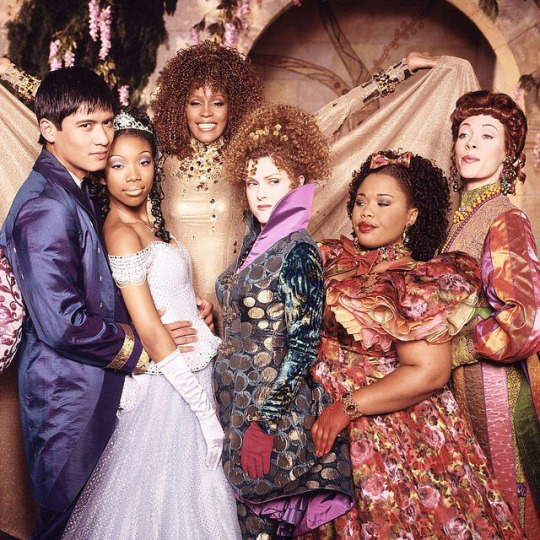
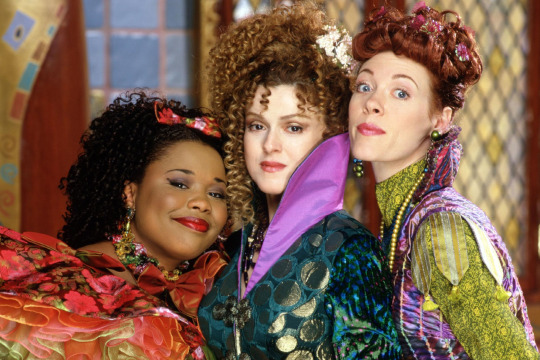
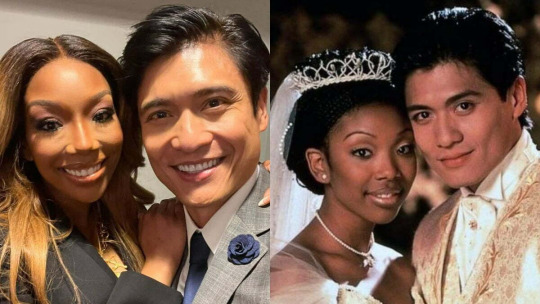
Fuck all the whiners, give me this shit again.
Thing they have to do is just cast them, stop talking about it after the fact. Stop talking about having a black Ariel, it's irrelevant.
Are they making a movie, yes nice is it gonna be rad, also yes, sweet let's go see it then.
This I would say carries a caveat where real people and deities remain true to their indigenous descriptions.
Thor is Norse the king of England is white Jesus is Jewish, Muhammad is not on screen but if there's a voice get a Arabic person to do it.
that's about it
12 notes
·
View notes
Text
March 21, 2021: Orlando (1992)
Tilda Swinton...confuses me.
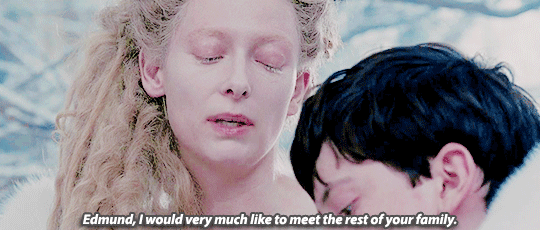
Like, in a good way. Because Tilda may be the most versatile actor working today. I mean, look at the goddamn filmography, and you’ll see what I’ve mean. I’ve seen Tilda Swinton in a lot, surprisingly, and I don’t think anything I’ve seen was bad. For example, I am an ARDENT defender in the portrayal of the Ancient One in the MCU.

I understand the controversy here, but I actually think this is excellent casting. Especially considering...being comic book-accurate would NOT have been a good idea with this role, if we’re trying to AVOID controversy. But Tilda Swinton FUCKING KILLED IT in this role, and I will always be happy for this choice.
Let’s see, there’s Jadis in the Narnia films, as shown at the top, there’s Snowpiercer, as Mason (an amazing character, and an acting job that Swinton disappears into), Moonrise Kingdom as Social Services, The Grand Budapest Hotel as Madame D., and Gabriel in Constantine. Which is a good segue to the next talking point...
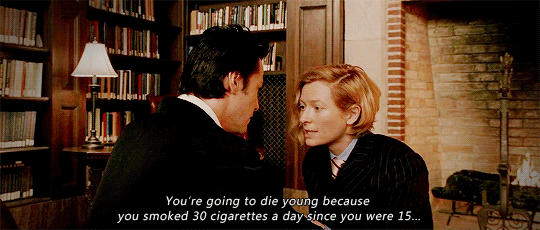
Gabriel is pointedly androgynous, and honestly, Tilda Swinton kind of is as well. You may have noticed that I haven’t used any pronouns in referencing to Tilda Swinton, entirely out of respect. Gonna be a little hard to keep up with, so I’ll be using she/her from here on out, only because those are the pronouns that Swinton’s most recently promoted for herself. She’s also referred to herself as queer of some variety, as well as being famously gender non-conforming.
Which is fitting, given that a lot of that public image began with today’s movie, one of her first big roles. I’ll be revisiting Swinton in the independent movie scene in a couple of months, but this may be a good introduction. Instead of spoiling anything off the bat, I’m gonna jump right in. And so, I present: Orlando. SPOILERS AHEAD!!!
Recap (1/2)
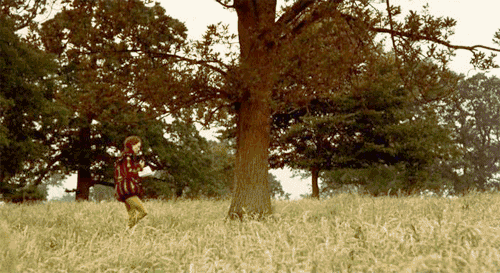
We begin with a young man named, well, Orlando (Tilda Swinton), a young man with a feminine appearance and a good upbringing. His name means power land and property, but all he really wants is company. He writes and rests by a tree in the day, but falls asleep by mistake. When he wakes up, he runs back to where he’s meant to be, with a tribute to Queen Elizabeth I (Quentin Crisp) playing in the background. And that’s a REAL song, by the way, actually sung in the 1600s for Elizabeth! Very neat.
A title screen flashes, reading “1600: Death”, and we see where Orlando is meant to be. He speaks poetry for the Queen and her court, but is interrupted by the aged queen, who asks whether or not his poem is appropriate for her presence, as the poem is about youth, and Queen Elizabeth is not that. Orlando’s father (John Bott), who is serving as host to Elizabeth, intervenes on his behalf. However, it doesn’t seem to matter to the Queen, as she invites Orlando back to England to serve as her “favourite”. He accepts, and soon lives alongside the Queen. She quickly promises Orlando much land and property, for him and his heirs, but on one condition: that he does not fade, wither, or grow old.
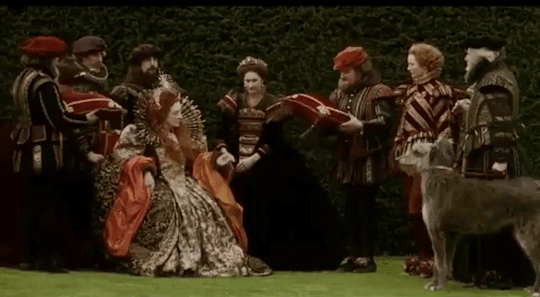
The same wish cannot be applied to Elizabeth herself, nor to his father, as both grow old and die soon afterwards. Fast forward 10 years, and it’s a cold winter in England. Visiting Orlando’s vast estate is a woman from Russia, named Sasha (Charlotte Valandrey), and Orlando quickly falls for her. This is to the dismay of Euphrosne (Anna Healy), his fiancée? I’m not sure, to be honest, but they’re definitely involved, and she’s definitely upset.
However, this is also a scandal for everybody else as well, not just because Orlando’s already engaged, but also because Sasha is Russian, during a particularly poor economic period for the country. Euphrosne angrily throws his ring back at him, and Orlando speaks directly to the audience, telling us that a man must follow his heart. The two go to his private cottage, and they start to make out, when Orlando suddenly comes down with intense melancholy.
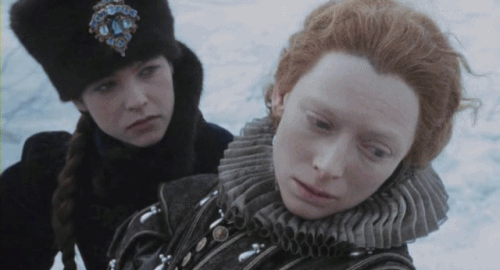
Because this is such great happiness that he feels, but this happiness too will one day end. Which is, like, the most emo-shit I’ve ever heard, but I’m kinda here for it. And yet, that happiness does indeed end, when Sasha is forced to return to Russia, despite Orlando’s pleading for her to stay. He asks her to meet him at London Bridge, so that they may elope together.
Later, Orlando happens upon a performance of Othello, noting to us that it’s a terrific play. This is as the death of Othello is being played out, so that’s probably foreshadowing, right? Anyway, Orlando leads two horses through the thick fog, waiting for Sasha to arrive and come away with him. But as a storm sets in, there is no sign of Sasha. And Orlando stands there in the rain. Said rain, though, soon becomes ice, underneath his feet, floating away down the river, along with his hopes of a happy future with Sasha. The treachery of women, according to Orlando.
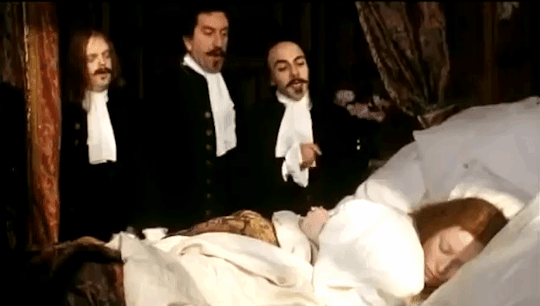
Over the next week, Orlando languishes in his bed, asleep for the entire time. Increasingly more servants are brought up to try and rouse him, only for him to remain asleep, no matter what they do. But then, he wakes up, noting that he can only conjure three words to describe women, none of them worth explaining.
Forty years later, and the title screen cries “Poetry”! And Orlando looks exactly the same. Guess he really took that whole “don’t grow old” thing from Elizabeth to heart, huh? He speaks to a poet, Nick Greene (Heathcote Williams), and gushes about his poetry, which is a pursuit that he loves greatly. But Nick is...well, Nick is kind of a dick, to be honest. Orlando wants only to share his love and his poetry with him, but Nick’s only in it for the money. Not a true artist, and he mocks Orlando’s poetry, which he reads only after Orlando offers him money. And then, he writes a poem mocking Orlando further, which angers Orlando...but doesn’t stop the money flowing to Nick.
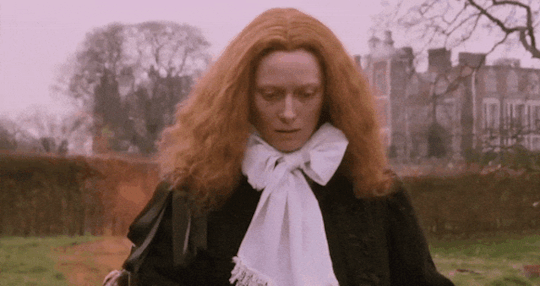
Orlando moves onto his next pursuit, in 1700, in the next section: Politics. Now over 100 years old, Orlando becomes an ambassador to the Ottoman Empire, and travels to Constantinople. There, he receives a somewhat rough and awkward greeting, which Orlando is not helping with. They share some Turkish coffee, Orlando has trouble drinking that Turkish coffee, they drink a LOT of Turkish coffee, and they toast to multiple things, including the “beauty of women, and the joys of love.” Orlando pauses at this, and reveals that he is still suffering quite a bit of heartbreak. His Turkish friend, the Khan (Lothaire Bluteau), bonds with him about this.
After 10 years, Orlando has fully retreated into life as a Turkish man. This is interrupted by a British emissary, sent to bring him news of a new appointment and power from the Queen. However, something goes wrong when the Khan arrives and takes Orlando hostage. The city is under attack, and the Khan asks Orlando if he will help against their enemies. Orlando agrees, and gives them arms, and heads to help himself at the walls. There, he witnesses a man dying, and it shakes him greatly. And just like before, he sleeps it off for seven days. And then...she wakes up.

YUP. WHAT.
Yeah, um, Orlando is now a woman. Like she says: “Same person, just a different sex.” Which is a very interesting premise, not gonna lie. Looks like Orlando now has to live life as a woman, which is going to be...difficult in 1700s Turkey. Or England. Or anywhere. Or any time.

Still, Orlando approaches this new life with aplomb, and without really any needed caution. Parading in some awesome dresses, she greets fellow nobility as the lady Orlando. However, the emissary from earlier, Archduke Harry (John Wood), begins to recognize her as similar to the lord Orlando.
In speaking with a group of poets, however, Orlando learns EXACTLY what men think of women in this society, and it’s not even a little bit good. She leaves, enraged and embarrassed. Harry also speaks with her, assuming that she was a woman all along. However, Orlando’s in EVEN MORE shit, as she’s quickly served with papers that are an attempt to take away all of her property and titles, because Lord Orlando is legally dead, and Lady Orlando is a woman, which one of them says is basically the same thing. FUCKIN’ YIKES, BRUV.
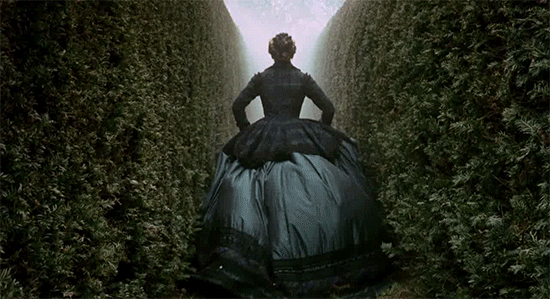
Ah, but Harry tries to help by proposing to her ON THE FUCKIN’ SPOT. He believed that Orlando was perfect as both genders, and is happy to do it. However, Orlando understandably refuses, and after Harry tells her that she will die as a spinster, alone and dispossessed, she runs into a nearby hedge maze. And while in the hedge maze, time passes, and her outfit changes to match the period accordingly.
Forward 140 years now! The year is 1850, and a new chapter begins: Sex.
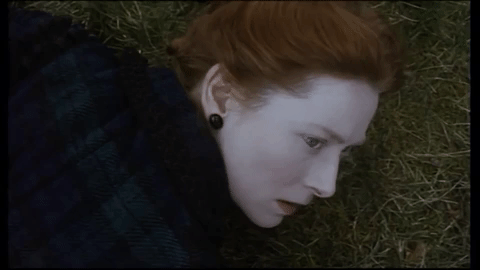
And as she runs from the maze, she runs into who else...but Shelmerdine (Billy Zane), a man who...Shelmerdine? SHELMERDINE? What fuckin’ witch cursed his entirely family line to have THAT name? That’s the kind of family that was named AFTER a bridge, not the other way around! WHAT KINDA NAME IS FUCKIN’ SHELMERDINE?
Well, I’ve looked it up now, and it is apparently a real name. So, if any Shelmerdines are reading this...I mean, I’m sorry, but also, FUCKIN’ SHELMERDINE? OK, back to Shelmerdine. He’s twisted his ankle falling off his horse, and Orlando is now taking care of him. She reveals, in the process, that she’s about to lose everything. The reasons for that aren’t quite said, but Shelmerdine offers a place at his side, back to the great free land of America.
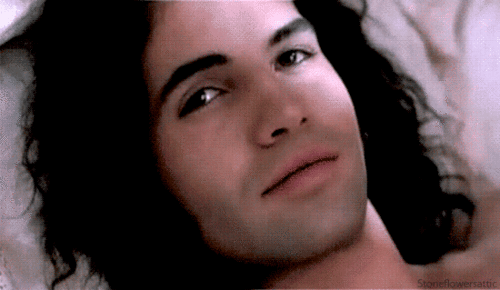
After having a conversation about the roles of men and women in the world (which is interesting given the context of the film in general), the two fulfill the chapter’s imperative. And we never see the act, but we do get some interesting angles and hand-holding. But the next morning, this post-coital reverie is interrupted by the lawyers from the Queen. The lawsuits have been settled, and Orlando has been legally declared a woman, meaning that unless she has a son, all of her possessions will be lost.
Shelmerdine (I swear, every time I say that name, a fairy gets chlamydia) leaves as well, with the southwest wind. As he heads back to America to fight for freedom, Orlando stands in the rain, facing an uncertain future, and broken fully by the politics of the time period.
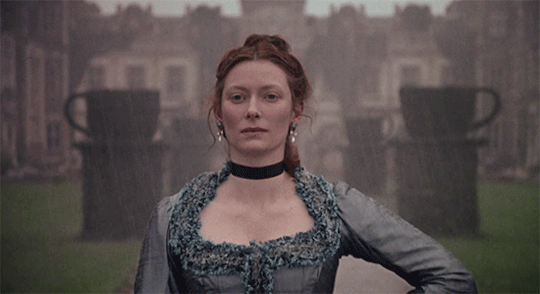
And then...the sound of planes overhead. Looks like a new time period once again, heading into the periods of World Wars, and Orlando is now...heavily pregnant. OH. FUCK. Welcome to the next chapter: Birth.
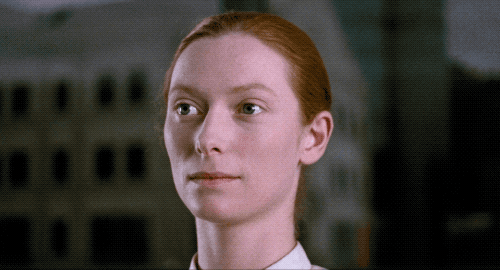
We jump past the period of World War II, and to the 1990s! Orlando is presenting a book to a publisher, and he believes that the book will sell. With her young daughter in tow, she finally goes back to her old mansion, now finally able to go back after losing it 100 years prior. The narration from the beginning repeats, recontextualized for Orlando’s new life. She is over 400 years old, and finally, FINALLY...she is happy.
youtube
And that’s Orlando! I think I loved it. Real talk, this was a fascinating movie, and I’m into it. I’m very much into it. I’m sure there’s more to be gleaned from this film, but I’m glad I watched it regardless. More in the Review, though! See you there!
#orlando#orlando 1992#sally potter#tilda swinton#billy zane#lothaire bluteau#john wood#virginia woolf#orlando film#fantasy march#user365#365 movie challenge#365days365movies#365 movies 365 days#365 Days 365 Movies#365 movies a year#mygifs#my gifs
61 notes
·
View notes
Text
none of this is revised properly, so expect a lot of meandering. this is me yelling into the void.
i’m indifferent to marvel and this genre in general: i haven’t read the comics; i’ve watched many of the marvel movies, but not all of them. my favorite is black panther, and i also like guardians of the galaxy—maybe doctor strange, too (while i have a few issues with it, i ultimately enjoyed the journey and would rewatch it)...?
that said, i appreciate how you don’t necessarily have to see all of the movies to understand the gist of what's going on. sure, you’ll get more out of it if you do, but i don’t think it’s necessary. i enjoyed all of the cameos and the revisited scenes that i recognized in endgame.
other things that i liked in endgame—ones that i immediately thought of...
the final battle is awesome — the music is wonderful, and i loved seeing everyone united and together; it's a great moment
time heist — because TIME TRAVEL
nebula! — i really enjoyed seeing her confront her old self; i’m guessing she opened up an alternate reality by killing her old self, and i wonder if that will be addressed in the future
gamora + nebula — UHHH, I JUST LOVE THEM
nebula + iron man — the lil football scene was cute
the ancient one — hate how she’s whitewashed; love tilda swinton; pretty much screamed when she reappeared... ;;;_____;;;
doctor strange + iron man — they play off of one another well in infinity war, and i liked seeing them here too
iron man — i don’t like what it means for pepper and their daughter, but ultimately i like the way his story ends
hulk in a cardigan + glasses
rocket + thor — their moments together in infinity war are delightful; while i think their dialogue is a bit iffy at times in endgame (i.e. the whole "you think you lost ppl??? i've lost ppl too!!!" bit because comparing losses on top of everything that's lobbed at thor in this film KINDA pisses me off)
starting with thanos’ death — i didn’t expect it, and it got me engaged in the beginning
INFINITY WAR
i thought infinity war was okay...? maybe less than okay now after endgame.
i liked the final battle. i loved how intense it was, and even though i wasn’t familiar with wanda or vision or their relationship, i felt for them. i enjoyed seeing the guardians of the galaxy crew + iron man + spider-man + doctor strange team up a lot; i liked seeing all of the black panther characters again, too.
there are some parts of it that i didn’t like when i first watched it, but i decided to wait until i watched endgame before picking at / thinking more deeply about them. after watching the sequel, though, my thoughts are pretty much the same.
thanos as the villain protagonist — it’s an intriguing way to tell the story, and i’m all for it in theory, but it ultimately doesn’t work for me. for him to work, i have to be able to empathize with him and understand his cause. i have to believe in him and his goal. he believes in what he’s doing, sure, but can i?
no. i can’t because literally what the fuck. the entire concept of “too many people in the world, not enough resources” is bullshit, and it doesn’t help that thanos’ thinking echoes that of malthus / ehrlich which is false and is also rooted in racism + classism. SO YOU KNOW... THAT’S COOL, I GUESS.
it might be? asking too much of the writing to address thanos’ argument on a philosophical level, but just having the other heroes call him a “madman” all the time—! it kind of drove me nuts as i was watching because it doesn’t highlight the fundamental flaws of thanos’ thinking in the first place. it’s a good vs. evil story, it’s “not supposed to be that deep,” i get it, but it just really bothers me how this film reduces the overpopulation myth into “oh, he’s just crazy” because UH... there are actual people in the world who subscribe to thanos’ thinking as fact and, frankly, it’s dangerous to lay the argument out like that and not challenge it on a higher level.
there’s thanos’ thought process and then there’s just... thanos himself.
i’m supposed to feel for this guy? why? because he’s abused his daughters over and over again...? he even tortures nebula in this film???
which leads me to how he acquires the soul stone. to obtain it, you have to sacrifice someone you love. okay, i buy it, fine. but thanos loving gamora? what.
what the fuck. he abused her, he manipulated her—i??? sorry, that’s not love. gamora even says in the film, “this isn’t love,” and you know what?! SHE’S RIGHT. as far as i’m concerned, thanos shouldn’t have gotten the stone, and if the stone accepts him as its keeper just because he flings gamora off a cliff then the soul stone can go fuck itself.
in retrospect, the whole “fling your loved one off a cliff to get the soul stone” is dumb as hell, but i bought the concept while watching, so it’s fine, i guess.
whatever... he gets all the stones in the end... and then there’s the next movie.
ENDGAME
as i said before, i liked thanos’ death in the beginning. it’s unexpected and it made me curious as to where the movie would go from there.
after that, it’s a five year time skip.
when they mentioned time travel, i was excited! the film kind of drags to get to the actual time traveling, however. i get that it’s important to establish how it all works, etc. but BOY. does it take a while. i was shocked when i saw this movie would be 3 hrs. long, but now i kind of understand why.
the time travel is fine. i chuckled at don cheadle’s bit with the “why don’t we just strangle baby thanos” and that’s as much as i liked from this part of the film.
just... the way grief is addressed and handled here... what.
hawkeye. it’s one thing for the other avengers to be, “we don’t know where he is or what he’s been up to.” it’s another thing entirely for them to be aware of what he’s been doing and then DO NOTHING ABOUT IT FOR FIVE YEARS. just—what?! this isn’t a priority for them? natasha and the others are just fine with hawkeye killing people as a way of dealing with the loss of his family? and no, it doesn’t matter that those guys he’s slaughtering are criminals or whatever—because UH, and i can’t believe i have to say this: killing people is not a good way to deal with grief??? not to mention the others clearly recognize it as something very troubling themselves—and THEN THEY DO NOTHING ABOUT IT. BECAUSE..... . . .. . WHY???
“i think we’re supposed to assume...” no, sorry. i’m not asking to have everything spelled out to me, but give me something. was hawkeye too hard to track (even though it seems they find him immediately in tokyo, but OKAY), were they too depressed over what happened, were they too scared to confront him—what was it that made them leave him like that for five years?
(don’t get me started on hawkeye in tokyo. yes, let’s just have him—a white man—slaughter japanese criminals because samurai swords are COOL and so is tokyo. fuck off. thanks for reminding me again just how diverse the main cast of this film is.)
it’s the same thing with thor. just... what?!
none of you wanted to reach out to him in the last five years and see how he’s been coping??? the people of new asgard were just... okay? with seeing him once a month? they were just okay??? knowing he was drowning himself in alcohol???!! what the fuck. like valkyrie is there in new asgard while all of this with thor is happening, what. WHAT.
it’s not like i expect hawkeye or thor or everyone else to be totally fine and dandy after all that’s happened, but it really irritates me how it seems like nobody’s tried to help or reach out to either of them in all these years. if they did, just imply it better???
moving on, it’s endearing to see thor power through his own misgivings and self-doubts during the movie, but those fat jokes can fuck off. because you know it’s not like REAL PEOPLE deal with depression or guilt or anxiety through food. it’s not like weight gain is a REAL LIFE thing that happens to people who are depressed or stressed or anything. YEAH, LET’S MAKE FUN OF HOW FAT HE IS BECAUSE HAHAHAHAHA FAT JOKES. FUCK YOU. at one point, thor reunites with his mother in the past, who literally recognizes his grief/emotions + mentions how the future hasn’t been kind to him, but HAHAHA DON’T FORGET TO HAVE HER MENTION HOW HE SHOULD EAT A SALAD BEFORE HE LEAVES.
it’s lazy humor, and that’s how i feel about most of endgame’s jokes. i think there were one or two moments that got a real laugh out of me and that’s it.
it just infuriates me how everyone else’s pain and anguish is allowed to be taken seriously, but not thor because HAHA HE’S SO FAT NOW. this picking on thor happens throughout the movie, and... it’s just been a LONG TIME since i was actively annoyed while watching a film, and even thinking about it now upsets me A LOT.
maybe i wouldn’t think the first portion of the film to be so slow if i enjoyed these different reunions, etc. but i was so worn down by the above points that i just wanted the time travel bit to start already so we could leave this behind and move on.
like i said before, i enjoyed traveling to older films, revisiting scenes, seeing different versions of the characters, etc. it’s really cool to see just how many people they brought back for endgame.
but natasha and hawkeye, though. what the fuck? WHAT THE FUCK?! THERE’S TWO PARTS TO THIS...
so... you have to sacrifice someone you love to get the soul stone. SACRIFICE... .. . . AS IN.. .. . WILLINGLY.. . . . SURRENDERING... SOMETHING... sorry but it looked like natasha fucking sacrificed herself instead of hawkeye sacrificing her? SHE KICKED OFF THE ROCK SO HE WOULD LET GO OF HER WHILE HE HIMSELF DIDN’T WANT TO LET GO. HOW IS THIS A REAL SACRIFICE OF A LOVED ONE??? NEITHER OF THEM WANTED TO GIVE UP EACH OTHER, NEITHER OF THEM WERE WILLING TO ACCEPT THE SACRIFICE THAT NEEDED TO BE MADE.
like thanos’ acquisition of the soul stone is bullshit because he didn’t truly love gamora but at least he willingly made that sacrifice. i mean, if you want an actual version of what the soul stone rule dictates, go back to infinity war with wanda and vision: they love each other and, in the end, despite her reluctance, wanda ultimately chooses to destroy the mind stone, sacrificing vision, because she knows thanos can’t have it!
also... UH, WHY NATASHA??? yeah, because i needed that again after gamora. because i needed that again after ALL THE OTHER DEAD DAUGHTERS OR WIVES OR WHATEVER + MAN PAIN, DELICIOUS MAN PAIN that happens in the other films. HAHA.
not to mention using the same shot on natasha as the one on gamora in infinity war—just a broken body lying in a pool of blood at the bottom of a cliff. cool, cool. not infuriating at all.
again, i like the time travel in this movie; it all makes sense. but i didn’t really get how evil!nebula was able to teleport thanos and his entire ship to the present...? i guess they engineered more of the particles they stole from good!nebula or something...?
finally, steve rogers. uhhh... i don’t think i would’ve minded his ending so much if the overall tone / message of the movie were more consistent...?
in the beginning, after the five year time skip, he’s at some kind of support group, and he says something like, “you need to try and take little steps, you have to move on” after all that has happened. that’s a powerful message, and it’s suitable for endgame.
the message is contradicted somewhat in the beginning, since the heroes choose to undo what thanos did. but throughout the film, the characters go back in time and revisit the past: past selves, past events, past mistakes—people of the past that are no longer with them in the future. eventually they all have to say goodbye and return to the present without them: move on, knowing and accepting that there’s some things that you can’t redo or change.
steve and peggy also address this concept in another captain america movie. they reunite, when she’s old and lying in bed, and she tells him basically the same thing he says in the support group...?
PEGGY (CAPTAIN AMERICA: WINTER SOLDIER)
The world has changed, and none of us can go back. All we can do is our best. And sometimes the best that we can do is to start over.
this message pretty much speaks to the journey of most of the characters. thor with his mother, wanda with vision, hawkeye with natasha (ignoring how i hate how everything happened), etc.
but by going back in time and choosing to stay with peggy, it doesn’t seem like steve aligns with that message at all...? and it’s weird because he’s the one to bring it up in this movie—and it’s echoed in his other major films? so having steve ultimately not being able to move on from peggy and the life he could’ve lived is...??? it just seems to contradict endgame and everything else in it, and it’s just... weird to have the movie end like that. i’m not sure how i feel. it’s sweet, but... IDK. it feels very abrupt.
i enjoyed the big final battles of both movies, but the journey to get to those moments is just as important... and sometimes it’s a rocky one. anyways, i felt very mixed / frustrated after watching endgame, and writing all of this down helped. i’ll probably delete it all later.
#p.#a very long ramble / rant about infinity war + endgame#now that i finally watched endgame#this should go without saying but: i'm yelling into the void; feel free to ignore; i might delete later#eta: okay now that it's been some time i'm gonna dump this in my general tag so i can find it more easily#the avengers#marvel
5 notes
·
View notes
Text
Marvel Cinematic Universe: Doctor Strange (2016)
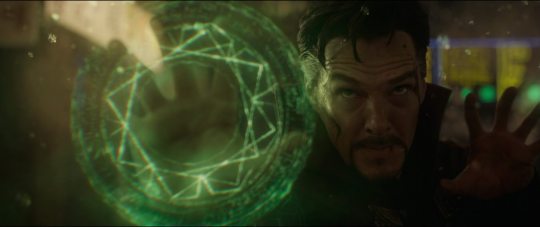
Does it pass the Bechdel Test?
No.
How many female characters (with names and lines) are there?
Two (16.66% of cast).
How many male characters (with names and lines) are there?
Ten.
Positive Content Rating:
Three.
General Film Quality:
A mediocre story that mostly relies on its special effects in order to appear interesting.
MORE INFO (and potential spoilers) UNDER THE CUT:
Passing the Bechdel:
The only time that Christine and The Ancient One share the screen is when the latter is unconscious and dying, so the failure here is particularly unsurprising. For that matter, you could even argue that ‘The Ancient One’ isn’t much of a name for a named character to have...
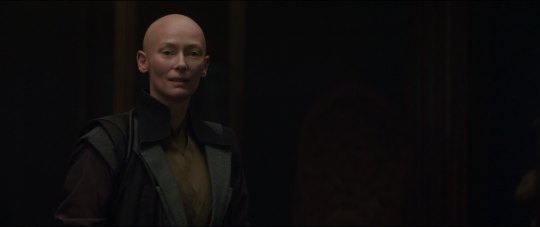
Female characters:
The Ancient One.
Christine Palmer.
Male characters:
Kaecilius.
Stephen Strange.
Billy.
Nicodemus West.
Etienne.
Jonathan Pangborn.
Mordo.
Wong.
Daniel Drumm.
Dormammu.
OTHER NOTES:
Kaecilius produces two blades simultaneously for the beheading of the librarian, but the head is removed in a single slice, which means that one of those blades was being waved around purely for the Cool Points of dual-wielding. All about that aesthetic.
Someone sure did enjoy Inception, huh?
Remember that thing about how Iron Man balanced Tony Stark’s initial self-absorbed asshole behaviour really well with his journey to heroism in order to make him palatable enough to watch in the first place? Strange categorically does not get that treatment. He’s just an egotistical jerk who is tedious to watch, and while his arrogance is variously addressed by other characters, him going through an emotionally redemptive process is presumed by the script rather than actually being included.
If they really, really wanted Benedict Cumberbatch for this role, I feel like they should have just allowed him to be a British doctor living and working in the States. The guy cannot do accents.
My sister saw them filming the scenes in the streets of Kathmandu. Small world.
I understand that The Ancient One was an Asian man in the comics, and while I applaud the decision to make the character female in this film (especially considering that the only other significant female character is the awkwardly-included personality-lite love interest Christine), they shoulda done it without the white-washing. Tilda Swinton is great, though.
...Mister Doctor.
in an altogether lacklustre film, The Ancient One’s final moments are a highlight.
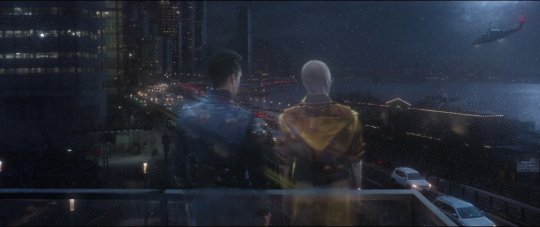
Also a highlight: the reverse destruction in Hong Kong, a much better use of the bountiful reliance on special effects in this movie, where so much of it previously had been empty spectacle.
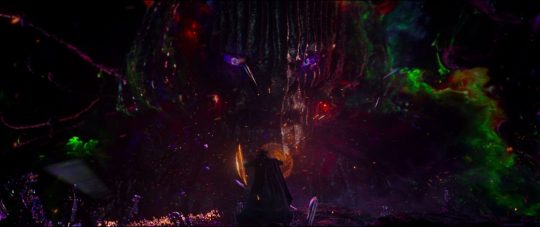
So, let’s talk a bit about that well-known writing rule: Show, Don’t Tell.
While this movie certainly does a lot of showing in the showy sense of the word - the frequently-empty spectacle of special effects as mentioned above - that’s not the type of show from whence story comes, and it leaves the thin plot to be almost exclusively told, without active support in the content of the film. Having characters charge around in the mirror universe doing weird spatial warping shit may be visually entertaining enough to hold the audience’s interest (at least the first time around), but it doesn’t help us to comprehend any aspect of the plot, its rules, what drives it, what matters, etc. It’s just...empty spectacle. Doctor Strange doesn’t pretend to be complex or deep storytelling outside of that anyway, and that’s ok insofar as there’s no reason it has to be or even should be, but what it is, when you set that spectacle aside, is...kinda nothing?

The game of ‘recount the plot as simplistically as possible’ goes like so: arrogant doctor suffers a seemingly incurable injury, searches for a cure anyway, finds a temple of the mystical arts, learns some mystical arts, fights some rival magicians, thwarts their evil plot, the end. As I’ve noted before, the ability to distill a plot to its simplest form is not in itself proof that the plot is somehow bad or lacking; the question is what does the actual film do to make that simplistic plot work for it? When the answer is ‘...kinda nothing?’, that’s a bad sign, and particularly unfortunate here because the whole mystical arts and magicians and the freakin’ multiverse thing has no excuse for being this boring. As a simplified plot, Doctor Strange still sounds like it could be intriguing, it’s brimming with potential, and yet the only thing it exploits that potential for is an excuse to over-indulge in special effects. It’s a waste of story ideas, to start with, and considering the cast, a waste of actors, too. If you’re not gonna make the most of their skills, you might as well cast a horde of unknowns and save the casting portion of the budget for, I dunno, another gravity-defying skyscraper battle?
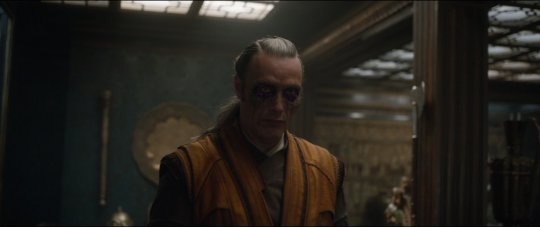
It should come as no shock at this point that I’m about to make this about the greatest resource of any story: the characters, both because that’s what I always do, and because damn, did they forget about characterisation being, y’know, a thing you actually have to write into the script? You can cast the greatest actors in the world if you want, and they’ll do their best to make a symphony out of the single note you give them to work with, but even then all they can do is make thin material look its best; they can’t magically generate story action and development in the places where their characterisation should have been. Let’s talk about Kaecilius as an example, because as the plot’s antagonist, he’s the most egregious of the lot: why is Kaecilius the villain? The part where he’s positioned opposite the protagonist characters and their ethos is an indicator, yeah, but why is he there, doing what he’s doing, what are his motivations? The basic answer is that he wants to bring Dormammu and the power of the dark dimension to Earth because he thinks it will bring peace and life everlasting. How do we know he wants that? We’re told so in the dialogue. Why does Kaecilius think this is a good idea? Don’t know. Turns out Dormammu’s bad news, but we don’t know how or why Kaecilius was misled on the subject. Power from the dark dimension is apparently bad news too - we know because we are told so in the dialogue - but why exactly this is and what the consequences are is unclear. We don’t have the information we need in order to understand why Kaecilius turned so severely, why certain rules exist or why they are being broken; everything we know, we know because it’s delivered to us in plain speech, not because we see it demonstrated in the events of the film, and considering that the core of the conflict seems to have come from distrust in The Ancient One’s teachings, it’s pretty ironic that the narrative then expects the audience to know or believe the truth in anything that she or her acolytes utters. If we were shown the truth of it, or at least shown the reasons to doubt or contemplate alternatives, we might be able to build a story out of this, but instead, we get ‘fuck you, it’s like this coz we said so. He has metallic purple eyeliner, isn’t that enough?’
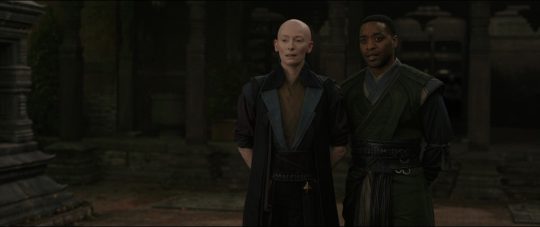
This lack of character building spills out to impact the rest of the characters too, naturally; the criminally-underused Mordo suffers especially as a result, since everything from his reason for coming to Kamar Taj, to his supposed rigid outlook on life, to his disillusionment with the cause, all relies on the audience simply shrugging off the idea of being shown the evidence in behaviour, the influence of the past, how it shapes his perspective in the present, etc, just forgoing anything that could be considered characterisation (and therefore, fodder for character development), and settle for ‘he’s like this: we know because another character said so’. Functionally, Mordo is hardly a character at all, he’s just The Other Guy that Strange sometimes interacts with, and big revelatory moments for him - Strange outing The Ancient One’s use of dark dimension power, Mordo grappling with his shaken faith - fall flat because we haven’t seen why this should matter, why Mordo can’t bring himself to see shades of grey in a situation, why The Ancient One has kept these secrets in the first place etc. The Ancient One herself fairs only marginally better as a character because the only thing we know about her (mostly because we’re told) is that she’s secretive; that said, ‘she’s secretive’ doesn’t work all that well as a sneaky way to avoid actually fleshing out a character, and the fact that instead of having any more meaningful secret revealed other than her power usage (which, again, isn’t that meaningful really because we aren’t shown a genuine reason to attribute it meaning, we just know that the characters are saying upset words about it), The Ancient One simply dies without ever becoming less enigmatic, means that we’re still left with more of a shell of a character than a real one, just the concept of a person, not an actual person with motivations and decisions we are privy to or could understand (and therefore, could judge or attribute meaning).
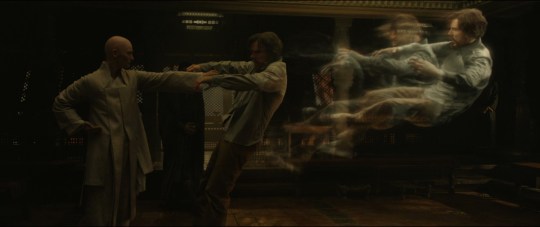
Strange, at least, is shown to be an arrogant jackass, but, as noted, that personality template is presented in a very cliche manner that - in the context of the MCU - reads much like a Tony Stark knock-off, only without any of the character nuance or developmental arc to pull it off in a palatable or entertaining fashion, and part of that problem is the fact that while Strange’s initial personality is shown, his process of change is...not. Like anything else in the film that should have been dynamic, it’s told to us in words more that it is demonstrated in actions. The earlier portion of the film is somewhat slow and low on intrigue or tension due to the fact that Strange doesn’t know the extent of the world he has become involved with, and he’s wholly occupied with his quest for a cure (though, frustration with his progress or with the fact that none of his training seems relevant to it is pretty light-on, as are any moments of struggle with his own self-interest vs the greater good - Strange’s hands are just a means to an end so that he has a reason to find Kamar Taj, rather than a sustained part of his struggles on a physical, mental, or emotional level). As soon as Strange learns that there’s a bigger battle out there, Kaecilius attacks (very convenient timing), and the story changes gears to launch headlong into its final act, with only time for The Ancient One to tell Strange that this is not about him (though, again, his self-interest has not remained centralised enough nor created continued strife necessary to make this declaration seem revelatory) before Strange is faced with either playing the game, or letting Kaecilius bring Dormammu and end the world. As such, Strange deciding that endless dark dimension torment is a bad thing isn’t really a big forward step (or even a selfless one - he could still be 100% focused on returning to his old life and leaving the multiverse to the pros, he just obviously can’t achieve his own self-interest with Dormammu around). Technically, we never see proof that Strange has given up his old ways, bettered himself as a person, or made any kind of decision that isn’t about his own ego (sticking around to become a universe-saving time-lord sorcerer is, um, a distinct step up the power trip ladder, after all). The idea that this character has actually gone through anything more than a career shift is just kinda assumed, rather than being demonstrated, and consequently, the idea that this is a character worth rooting for now is also, just assumed.
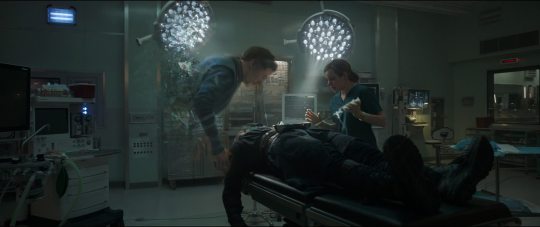
Ultimately, the moral of the story is pretty obvious - ‘show, don’t tell’ doesn’t have to mean ‘never provide exposition to explain anything’, but it does mean that you should try to demonstrate essential things like worldbuilding and characterisation as often as possible, if for no other reason than because letting your audience see that something is so is much more engaging and powerful than just telling them how it is. If all you’re gonna do is tell, you might as well just stick with reciting the plot aloud, it’d be cheaper and less time-consuming, and while it wouldn’t really take advantage of the fact that film is a visual medium, just churning out a bunch of special effects shenanigans without a plot to underpin them doesn’t take as much advantage of that as you might think, either. Imagine what an interesting, dark, twisty film we could have made out of this story if, say, questioning The Ancient One’s teachings (or cleaving to them unflinchingly) had been made a prominent concept, so that rifts in trust and the shaking of core beliefs about the universe were more meaningful developments? Imagine if Dormammu was a more significant idea about which we heard conflicting information from unreliable sources, imagine if we could see how tantalising Kaecilius’ perspective was, if Strange struggled at all with who to believe and how to reconcile his ego with the smallness of his existence in the vast multiverse, etc, etc. Imagine if the plot had some sort of core concept instead of just empty spectacle and placeholder characters. Imagine. What a waste.

1 note
·
View note
Photo

Georgie Henley for The Times of London - ‘There is pressure on child actors not to admit it’s hard’
She had a ball as a child playing Lucy in the Narnia films, but her schoolmates were unkind — not that it stopped her. Now she’s on the London stage // Keep reading for full interview
Georgie Henley vividly remembers her first day in Narnia. She was eight years old, 12,000 miles from home and surrounded by a film crew waiting for her to act on camera for the first time. Henley was playing Lucy, the plucky youngest child of the Pevensie family in the Walt Disney film version of CS Lewis’s wartime fantasy classic The Lion, The Witch and the Wardrobe. On the first take she looked at the camera because she didn’t know better. That error aside, she thought she spoke her lines all right. Yet the director, Andrew Adamson, kept asking her to do the scene again. And again. And again.
After about an hour of this she started welling up. Adamson came over and asked why she was upset. “And I just said, ‘I’m getting it wrong, that’s why you keep doing it over and over again, isn’t it?’ And he said, ‘No, we have to position the camera in different places, we do different shots and then we edit them together.’ ” She laughs at the thought. “I mean, it’s basic stuff, but I didn’t know because I was just plucked from nowhere.”
Now 22, Henley has just started her first professional stage role. She is starring in Angry, a collection of monologues by the restlessly provocative playwright Philip Ridley at the Southwark Playhouse in south London. She is upbeat, articulate and aware of the negative narrative that surrounds child actors and quietly determined to buck it.
She is hugely grateful for her experience on the three Chronicles of Narnia films: The Lion, The Witch and The Wardrobe in 2005, Prince Caspian in 2008 and The Voyage of the Dawn Treader in 2010. They have set her up financially, so that after finishing her degree in English at Cambridge University in 2016, she was able to move to a flat of her own in London. Unlike some other child actors, she says, who get pressured to support their families, her parents — Mike, a former solicitor who now works for HSBC, and Helen, who chaperoned her on all three Narnia films — made sure she kept her earnings.
“And I don’t take any of this for granted,” she says. “To have a franchise at a young age, it’s what a lot of actors spend their whole lives trying to get because you have guaranteed work and a guaranteed pay cheque. Not that I really thought about that at the time.” On the first film she didn’t even realise she was being paid. She did by the second film. “But it was like Monopoly money to me.”
Yet while she thinks there is “scaremongering” about what it’s like to be a child actor, she is quick to admit that it had a big impact on her school life. It happened almost by accident: a casting director, Pippa Hall, who had discovered Jamie Bell for Billy Elliot, held an audition at the drama club to which the seven-year-old Henley went each Tuesday after school in Ilkley, Yorkshire. “I was just lucky,” she says. She laughs awkwardly at the suggestion that, however she got the job, she was unusually good once she started doing it. “Thank you! I can’t cope with people saying nice things to me.”
She was “quite a weird child; on the fringe socially, just always off in my own world”. At first she thought she was auditioning for a panto in Bradford. As the process dragged on for months, and she started to travel down to London to audition alongside children from stage schools, she and her parents got to realise what it might involve. In fact, her parents pulled her out of the process when they were told it would involve four months filming in Canada. Her older sisters Rachael (who played the older version Lucy in the first film) and Laura stepped in, insisting that this was too big an opportunity to pass up. Her parents relented. Whereupon it became seven months in New Zealand instead.
“It changed my life,” Henley says. “It sounds cheesy, but it’s true. And I didn’t know anything. All I knew was what I had learnt in my drama club every Tuesday, and having parents who never told me to be quiet or anything, who liked me for being a little bit odd.”
Filming, give or take that first-day wobble, was wonderful. She apologises again for cheesiness. “It was like this magic thing. Every day it was a new costume, a new setting, new creatures to imagine you were talking to.” She watched the first film again two Christmases ago with her grandmother and enjoyed it. Certain memories from filming linger more than others: the day she played mini golf with Tilda Swinton, who was playing the White Witch, or the surprise party on set for her ninth birthday, when her father and sisters flew out to join her mother. “It was one of the best days of my life. It was just amazing. But it’s so funny when I meet children that age now and I think, ‘You are tiny.’ I remember what I was doing at that age and I can’t believe it.”
She has kept in touch with her co-stars, although they are rarely in the same room together. William Moseley, who played the oldest boy, Peter, acts in Hollywood. Anna Popplewell, who played Susan, still acts and lives round the corner from Henley in north London. Skandar Keynes, who played the younger brother, Edmund, overlapped with Henley at Cambridge. He was in his final year when she was in her first, but by that time he had stopped acting. “Nobody else will ever be able to understand what we did together. It’s this crazy, amazing thing. You just can’t explain it.”
As well as filming in New Zealand — and Eastern Europe and Australia in the later films — there was foreign travel for publicity junkets. She has visited Japan three times, she says, but doesn’t feel she knows the place since she spent most of her time there in hotel rooms. The same goes for New York. She will never forget being 15, waking up in her hotel room in Tokyo and remembering that she had a mock chemistry GCSE to do. She kept up with school work through tutors. The child actors shared classrooms as well as dressing rooms while on location.
Returning to normal life between films was difficult, though. Her family did a great job of keeping her feet on the ground, she says. They are all “very close”. However, she struggled when she got to Bradford Grammar School when she was 11. “Secondary school is where I struggled. I loved the work side of school, I loved learning, but the social side was a minefield. And part of that was worsened by the films that I had done, by me being in and out of school.
“There is such a pressure on child stars not to admit that it’s hard. To smile in interviews and say, ‘Yeah, I love my double life,’ and pretend they are a special agent or something. Because if they admit that it’s hard sometimes they sound like they are difficult.” She wouldn’t change anything about the films, but wishes she hadn’t played her achievement down so much when at school. She didn’t act in anything at school until her final year. “It was that thing of not wanting to put your head above the parapet for fear of it being sliced off, but I should have had the confidence to be proud of what I did. I was bullied mercilessly; people were so awful to me at school. It was amazing getting to uni and people being, like, ‘That’s so cool!’ And I was, like, ‘I know, right, isn’t it?’
“So I wish I could say to the 13-year-old me, ‘Be proud of what you’ve accomplished.’ And that doesn’t mean being arrogant. They are not the same. I think I conflated the two things.”
At university she studied English, but did theatre too. “You can experiment and f*** up or succeed, and if you do well nobody cares a week later and if you f*** up nobody cares a week later.”
She wrote and directed a couple of short films while there. She also kept up her film acting, although without Narnia budgets. In Perfect Sisters she played one of two Canadian teens plotting to kill their mother. The Sisterhood of Night, an American film, was a bit like The Crucible reworked for the age of social media. She also made Access All Areas, which was about a bunch of teenagers who go on the run to an island music festival. “It was amazing to be doing different characters,” she says. “People thought it was me trying to get away from the Lucy Pevensie thing, and maybe it looked like that, but your tastes change.” Before that, she was offered other fantasy or period films, but preferred to wait until she could do something different.
Talking of which, her professional stage debut certainly ticks that box. Ridley, known for troubling plays such as Mercury Fur or Dark Vanilla Jungle, has written six “gender-neutral” monologues, including one long one that is one of Henley’s favourites, about a teenaged sexual experience that may or may not have been entirely consensual. How you view it, Henley suggests, depends on which night you attend. She and her co-star, Tyrone Huntley, alternate who performs which three monologues each night. “You’ve got me, a white, straight woman, and Tyrone is a black, gay man; it’s two entirely different identities, but it’s the same words.”
Henley was already a fan of Ridley and had even written an essay about him at Cambridge, although she was mortified when one of the producers told him this. She will not let him read it, she says with a chuckle. She did some directing at university and would like to do more. Later this year she shoots her next short film. Beyond that some other work seems to be looming, but nothing she is sure about yet. She lives on her own, loves having her own space and isn’t in a relationship. “I’m a single Pringle. I don’t know how people my age have time for anything like that because I sure as hell don’t. I’m trying to keep myself together, let alone worry about someone else.”
The previous day she had picked up her first pay cheque for Angry.Fringe wages can’t be huge, but she’s thrilled to be paid for doing a job she loves. She is happiest when working. “Some child actors grow up and their career gets quite calculated. Their management say, ‘You can do an indie film, then you have got to do a blockbuster, and then you can do two more indies,’ but I’m just looking for stuff that scares me and challenges me; things I haven’t done before. Because I still feel like I don’t know anything and I have still got lots to learn, so having to jump in at the deep end like this . . .” she laughs. There is nowhere to hide when you’re doing monologues. “And that is terrifying, but it’s also a gift.”
113 notes
·
View notes
Text
so i was having a conversation with someone who is leeching off my netflix using my netflix to watch Luke Cage right now... and it was about how they whitewashed Iron Fist (and also Dr Strange)
But they said, “You can’t have it both ways though? You can’t get upset if they make a character white, when they’re always making a random character black or something when in the books they were white.”
And... you get a flashback to everytime you’ve ever had to have the exact same ‘diversity and representation are important’ conversation, and you realise you’ve played this game with them before... and clearly it hasn’t changed their mind. But you’re gonna say it anyway...
“Because white people are in everything, but like, specific white people... and a lot of times when they switch out a character for a white person, it’s wiping out a very specific story.
Like in Iron Fist... he was meant to be asian, the people around him too... the whole comic series is pretty well-foundered in that. Dr Strange isn’t bendybonk cucumberpatch, nor was the ancient monk dude he needed to speak to... Tilda Swinton (you know, the freaky praying mantis bitch from Narnia, the White Queen?) in a bald cap???”
And then it goes around again, “Yeah but what about the reverse?”
“Because everyone in fucking stories are white and straight and ridiculously pretty... or tortured about how they’re white and ugly and tortured, or white and not straight but pretty and tortured... and it’s boring, mate...”
-
And clearly the point didn’t land... but it’s like, why is that the first thing people go to when they discover a character is whitewashed?
“Yeah but other characters, who were white, were randomly made not”
[Or some just flat out say a race, or a sexuality, or a gender orientation, etc.]
And it’s like... we can’t keep seeing the same 12 white actors in everything... pretending to have backstories thy clearly aren’t connected to bc it should have gone to a different actor...
Katniss Everdeen. Ghost in the Shell. Dr Strange. Luke Cage. fucking ALOHA. dozens of others, let’s be real... and most of these they discouraged people of the actual ethnicities involved to apply...
But remember how pissed people were when Percy Jackson came out and Grover (a satyr, dude who was half goat and a badass) ended up black? and fans were losing it online? Remember when they went back over the shitty mortal instrument books and changed just about everything so the characters were dynamic, some poc, some not-straight, etc. so they were more fun?
Like, where was the outcry when they did freaking “La La Land”, a story that literally took an entire narrative about the birth of jazz, from African-Americans, and handed it to a white dude who couldn’t sing. And his female white co-star who also couldn’t sing.
Like... isn’t that embarrassing? A red flag? When the two leads can’t sing or dance well enough that they have to have someone ELSE sing for them? Why didn’t they just get the people who sang for them?
Like, HAIRSPRAY had a narrative that focused on a fat white chick, sure, but there was a lot of screen time and accreditation given to the poc characters, and she never claimed to have made their dances up, and was always clear who let her use them... that was actually a pretty good musical/movie.
And Stonewall? You still can’t get over that.
The activisim was led by trans WOC, and they removed them, and made some skinny white dude the main? They marketed this revolutionary movement as “A young man’s coming-of-age story”... and it was like, the skinny white dude pretending to be gay on camera?
Wow. Buddy, let me tell you how easy it is to find a gay to cast... *thumps the wall and gays rain from the ceiling* my dude, take your pick...
Mostly, it adds to the story when not everyone is a cookie cutter, but you always have to hear someone bitch about it, because it causes them distress not to see themselves on the screen. As if someone being a different race, religion, sexuality, gender, socioeconomic class, political stance (okay you know what, I will never sympathise with a republican or the aussie equivalent), etc. is just impossible to empathise with...
Like... how do any of you read books, if that’s the case?
Is there an underground society that can only stand to read and re-read the boring-ass Nicholas Sparks novels over and over, praising each cookie-cutter plot and character endlessly? Did I not get the e-vite?
[Not to mention movies like SPLIT, and the one about a transwoman where they cast a cisman, what was that called? - which are inaccurate representations of mental health and gender orientation designed to feed stereotypes]
-
And also, the entire HP fandom losing their minds at the concept harry potter or hermione granger were not white?
Not going to lie, I imagined Hermione like me, a little girl with white skin and big, bushy, fuck-my-life-why-are-you-like-this easily-knottable hair... but other little girls were reading and imagining her just like them, with their features and hairtypes. And that’s totally okay. The varied fanart of poc and white versions of Harry & Hermione are all amazing, and it’s not hurting anyone... but people are still avidly searching the series for proof Harry and Hermione are white, that’s it.
Just look at the backlash for the Cursed Child, when they ‘DARED’ to cast Noma Dumezweni as Hermione. The HP fandom loved to talk about how inclusive they were... riiiiight up until someone challenged that slf-perception by changing things canonically, and the fandom flipped a table.
Listen... the kids, especially Emma Watson, did an amazing job. They all went on to do amazing things and it’s okay to have them in mind when you read the books, because that’s who a lot of people imagine, now. The hazards of making a book series into a movie series, really, a fixed ideal for the characters. But the thing is, the movie interpretation does not negate whoever else you had in mind for the main characters. Harry and Hermione are ambiguous, feature-wise, save that Harry has his mother’s eyes, and Hermione has bushy/thick/fuck-my-life-the-knots-are-winning hair.
They could be anything, between those narrow parameters. Harry could have been neon pink the whole book and JK would only reveal that afterwards, when the neon-pink aliens come to visit. The only one with specific features was Ron (and also Draco) in which they described the entire family features...
Not to mention, no one loses their shit when people draw Neville pudgy or blonde (like he was in the books)? Where is your ‘must be authentic’ god now...
-
“What is this PC/SJW cuck bullshit?” is still the funniest thing you can ever hear, though, when a movie or show or book ends up with a straight white character (or straight white cismale character) being switched out for something different. Even if it��s an invisible different, people get so up in arms. Thumping bibles and screaming about authenticity... dude, there’s a thousand grimdark muscly overhetero dudes out there in film, you will survive this. Stay strong.
-
This has been a random post, feel free to add in.
18 notes
·
View notes
Text
Smokey brand Movie Reviews: Mother May I?

Breh. Suspiria. Breh. Look, i loved this movie. I did. It’s f*cking brilliant. I loved the original. The use of colors and proto-slasher archetype feeds into my film snob sensibilities deliciously. As much as i love the original, this film that we have here? This outstanding movie that has been inspired by Argento’s classic? This thing is spectacular. There is next to nothing for me to gripe about, literally two things, so i’m just going to gush about it.

The Best
The camera work is f*cking amazing in this film. Every lingering shot, every dramatic zoom, every long take, every lazy pan; it’s all f*cking spectacular. Every shot has an energy; a visceral, kinetic, presumption about it and it inject panic into this movie. Seriously, there’s a dance scene at he climax of this film and the way it’s shot is just f*cking tension. Pure, unadulterated, tension. The score helped a lot, too, but that f*cking camera work was goddamn brutal, man.
This movie is bloody beautiful. The muted palette blends perfectly with the stark, bleak, world that Guadagnino has crafted and the way he kind of fills the screen with weird, asymmetrical, positioning keeps you, as the viewer off balance.He favors the left or right side of the frame and, when sh*t goes down, you’re caught off guard by how beautifully centered it all is. The way the film looks is as much a character as Susie Bannion or Madame Blanc.
The f*cking score to this thing is a perfect addition to the vision on display. Seriously, i spoke about the camerawork in that dance scene being tension? Add the intensity of the score and sound design and you have some sh*t that will ruin your goddamn night!
I was flabbergasted by how perfectly this film came together. Like, technically, wise. Everything i just mentioned and the editing, the direct, all of it; it’s f*cking outstanding. The is the best technical efforts i have ever seen put to film and that’s not even an exaggeration. I hardly ever mention that stuff outside of cinematography in my reviews but, f*ck man, EVERYTHING was good in this film!
The direction of this movie is breathtaking. Luca Guadagnino tells the f*ck out of this story! Dude has a vision and he gives that sh*t to the audience like some horrible, alluring, desperate, thing. F*ck, dude, what he got out of these actors? These performance, specifically from Tilda Swinton and Dakota Johnson? My god! And those dances, holy sh*t!
The pacing in this was f*cking ridiculous! this movie is two and a half hours long but it didn’t feel like that at all. Like, not even close. I legit wanted more when it ended and was visibly upset that i didn’t get anything else. I know this thing isn’t going to make enough money to warrant the sequels Guadagnino has in mind but this thing better make enough goddamn money so Guadagnino can make his goddamn sequels!
The f*cking choreography, man! The sh*t was hereditary meets Black Swan and it world. It works wonderfully! the pieces created for this movie are genius in their own right but as devices to drive the plot? Bro.

The Better
Tilda Swinton deserves, at the very least, a Golden Globe nod for her performances. With an S. She plays several characters and plays the hell out of them. I was enthralled by her Madame Blanc but it was her take on Josef Kempler that sold me. She plays that old man with such despondent futility, it’s actually pathetic. Dude was so inept and just did not know it. Not until it was much too late. She was simply outstanding and that’s saying the most because Ms.Swinton scene stealing performances regularly.
This is easily the strongest performance i have ever seen Dakota Johnson give. Easily. She’s never frail, or naive, or vulnerable. She’s as much a predator as this literal coven of witches and, while she realizes early on what they’re about, her ability to mask what can only be described as pure malice, behind such wide eyes was f*cking incredible. She played these b8Tches like a goddamn game, getting everything she wanted in the end. I’m not going to say she deserves an Oscar for this performance, not like Swinton, but she definitely deserves some recognition here. Her Susie Bannion is almost the exact opposite of Anastasia Steele and gt gave me a newfound respect for Johnson’s ability.
Mia Goth also turned in something marvelous. I’ve always been a fan of ol’ girl but i particularly enjoyed her in this. It hurt watching Sara Sims go the way she did for a second time, but i much preferred where Mia took here this go around. It’s a shame her character ended up where she did because i found myself rooting for her before i knew it.
All of the supporting cast also turned in great performances. I was surprised by how adept Chloe Moretz was in this. She’s usually playing like, i dunno, college-y/high school-y girls and what not. This role was not that. While her time onscreen was hilariously short, what she had, she worked. That being said, i am a little biased. I’m on record as being a total Chloe fanboy. Ma is mad talented in her craft and criminally underrated.

The Good
The only issue i really had with this movie is some questionable camera techniques toward the end. I kind of feel like i know what they were trying to get at but, in practice, it looked a little cheap. So did all that CG blood and gore effects. That sh*t looked like they ran out of money which was unfortunately. They blew their load on that car crash dance penalty in the beginning. Other than those two things, which are negligible in the grand scheme of things, i have nothing to criticize.
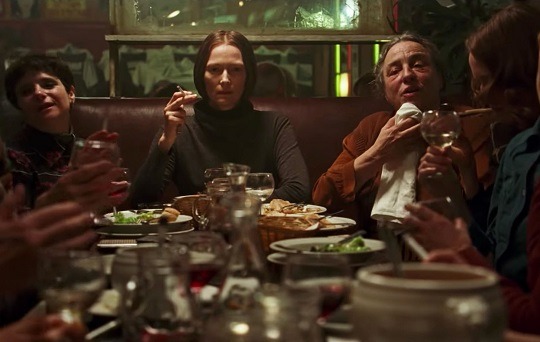
The Verdict
The passion behind the camera, the vision framed by the lens, the performances captured on film; It’s incredibly rare that movies can dance that waltz perfectly. Some have come close; The Empire Strikes Back, Inglourious Basterds, the Ghost In The Shell anime film, Thoroughbreds, The VVitch, and Forrest Gump all come to mind, but they fall just short. For one reason or another i can’t uplift them to that pristine status. However, in my life, i’ve been blessed to witness a perfect film more than a handful of times. Alien, to me, is a perfect film. Amadeus is a perfect film. The Dark Knight is a perfect film. Logan. The Usual Suspects. Ex Machina. Akira. Citizen Kane. Black Swan. 12 Angry Men. Blade Runner 2049. Hereditary. These are masterpieces. Cinematic masterworks. And Suspiria belongs with them. The technical aspects of this movie are only outstripped by the performances and breadth of scope. It’s horrifying and brilliant and disgusting and beautiful and goddamn genius. I loved every second of it.
This movies is definitely not for everyone, i freely admit that. Several people walked out of my showing about half way through but I understand why. Suspiria is not for the faint of heart. It’s not for the weak willed. This movie demands so much from you but if you’re willing to pay that price, it’s incredibly rewarding. Just know that, going into this, you’re going to have to commit. You’re going to have to accept horror. You’re going to have to allow yourself into this world fully. Approaching this like it’s just another slasher or Blumhouse travesty will only leave you disappointed. Suspiria is not that. It’s art. Brutal, sexual, cruel art.
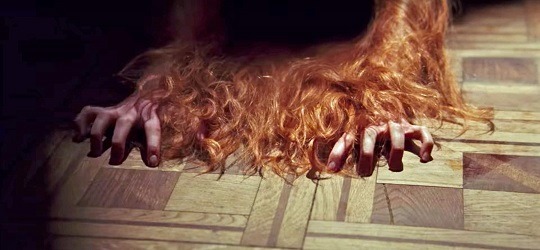
0 notes